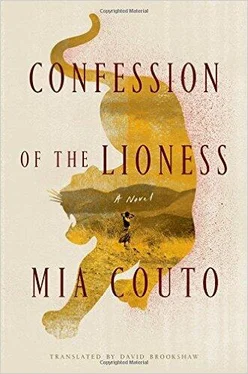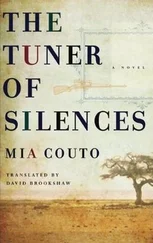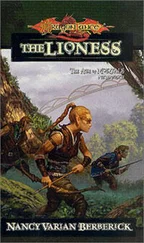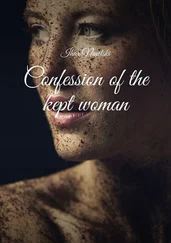But the administrator doesn’t want me to leave for the village just yet. He asks me to stop for a few minutes at the clinic. Naftalinda would be very happy to see me. Afterward, we would return together to Kulumani.
* * *
The First Lady occupies a private room. The sheets cover her vast body somewhat parsimoniously. Naftalinda’s shoulder is swathed in a large bandage, which looks like a minute rag on her. The woman takes my hand and looks at me with a maternal air:
I have a request to make. Take Mariamar with you to Maputo.
Mariamar?
She’s Hanifa’s youngest daughter. Next week I’ll be going back there too, and I’ll look after her.
Don’t worry, I’ll take her.
You’re a good man — you remind me of Raimundo, the village blind man. You have something in common, there’s something uncanny …
Uncanny?
That man is out and about at night, he sleeps out in the open. And yet he was always spared by the lions. Do you know why he was never attacked?
Don’t tell me he’s one of the lion-men?
On the contrary. It’s because, of all the villagers, he’s the only one who is a complete person, a complete human being. Just like you, our hunter—
And now me , Makwala butts in.
Yes, you as well. You’ve become my man again, my dear Florindo. Then she turns to me again: If you’d seen him last night …
I’ve got to go, Dona Naftalinda , I excuse myself politely.
Let me look at you. You look so happy, so young.
Last night I slept in good company.
So did I. Last night I was happy, after such a long time. Even with my pains, I was well loved, I slept well and dreamed well.
Naftalinda dreamed that her mother was lulling her once again in her arms. But she sang to her in Portuguese, which in real life never happened. All the lullabies were in Shimakonde.
Until yesterday , she says, my dreams couldn’t speak with my memories. Last night they could. Last night I was lulled by time.
* * *
On the way back, Florindo confesses that he’s going to quit his post. He’s going to be a teacher again. It’s not out of choice, but he’s resigned to it.
If it was down to me, I like politics more. But with Naftalinda, it just won’t work. Then, after a pause, he adds: You’ll write up your report on the hunt, I’ll write up the indictment against those who raped Tandi.
Tell me what happened with Genito.
It was a simple but enigmatic story, like everything that happens in Kulumani. The man had succumbed while killing the lioness, next to the road. The same lioness that had attacked Naftalinda and Mariamar.
Was Genito taken by surprise?
The administrator didn’t know the details. But he did know that the tracker and the lioness died together in mutual embrace, as if they both recognized each other as close relatives.
It was very difficult to pull their bodies apart. It was like a reverse birth. Apparently the writer even shed a tear. He couldn’t even take a photo of them.
* * *
I imagine the writer and his tear. Certainly an invented tear, just like the word he had created. And then I think the journey was worth it for him. Gustavo Regalo now knows what a lion is. And he knows even better what a man is. He’ll never again ask the reason for hunting. Because there’s no answer. Hunting happens independently of reason: It’s a passion, a giddy hallucination.
Are you sad you weren’t the one to kill the lions? Gustavo asks, point-blank.
Me, sad?
I know what you’re going to answer. That you don’t kill, you hunt.
I spent the night with the woman of my dreams. How can I be sad? For sure, maybe I’ll now want all the nights time has to offer. The hunter is a man addicted to miracles. The hunter is a demon saint.
Mariamar’s Version: EIGHT. Blood of a Beast, a Woman’s Tear
When the spiders join their webs, they can tether a lion.
— AFRICAN PROVERB
I now admit what I should have announced at the beginning: I was never born. Or rather: I was born dead. Even now, my mother is still waiting for my birth cry. Only women know how much one dies and how much one is born at the moment of delivery. For it’s not that two bodies separate: It’s the tearing apart of one body that was trying to preserve two lives. It’s not the physical pain that most distresses the woman at that moment. It’s another pain. It’s part of you that is detached, the gouging of a road that gradually devours our children, one by one.
That’s why there’s no greater suffering than giving birth to a lifeless body. They placed that inanimate creature in my mother’s arms and left the room. They say she sang me a lullaby, reciting the same mantra with which she had rejoiced in previous births. Hours later, my father took my weightless body in his arms and said:
Let’s lay her to rest on the bank of the river.
It’s by the water that they bury those who have no name. There they left me, so that I should always remember that I was never born. The damp soil hugged me with the same affection that my mother had devoted to me in her vanquished arms. I recall that darkened embrace and I confess that I yearn for it in the same way one does for a distant grandmother.
The following day, however, they noticed that the soil of my recent grave had been turned over. Was some subterranean beast taking care of my remains? My father armed himself with a cutlass in order to defend himself from the creature emerging from the ground. He didn’t get as far as using the weapon. A tiny leg ascended from the dust and turned on itself like some tumbling spar. Then the ribs, the shoulders, and the head appeared. I was being born. The same convulsed shudder, the same helpless cry of the newly born. I was being delivered from the belly from which rocks, mountains, and rivers are born.
They say that my mother aged as much as it is possible to age in that moment. To be old is to await illnesses. In that instant, Hanifa Assulua was one great malady. My father peered at my mother’s grave expression and asked:
So, am I the father of a mole?
That was when a strange light came to rest on my little face. And it was then that they saw how deep my eyes were, as deep as the river’s calm waters. Those present contemplated my face and were unable to withstand the heat of my gaze. My old father, fearful, stuttered:
Her eyes, those eyes …
A suspicion then began to stir in all of them: I was an inhuman person. No one dared say a word. But it wasn’t long before my mother realized: In my eyes there were the flashes and translucence of another, distant soul. In the solitude of her distress, she asked herself the reason why my eyes were so yellow, almost solar. Had anyone ever seen such eyes in a black person? Maybe my eyes had become so luminous because they had spent so long searching the dark subterranean depths.
Murkiness, it is said, is the domain of the dead. It’s not true. Just like light, the dark only exists for the living. The dead inhabit the dusk, that fissure between day and night, where time curls in on itself.
Those who live in darkness invent lights. These lights are people, voices more ancient than time. My light always had a name: Adjiru Kapitamoro. My grandfather taught me never to fear the gloom. For within it I would discover my nocturnal soul. In truth, it was the dark that showed me what I had always been: a lioness. That’s what I am: a lioness in a person’s body. My shape was that of a person, but my life would be a slow process of metamorphosis: my leg becoming a paw, my nails claws, my hair a mane, my chin a jaw. The transmutation has taken all this time. It could have happened more swiftly. But I was bound to my origins. And I had a mother who sang for me alone. Lullabies endowed my childhood with shadow and forestalled the animal that lay within me.
Читать дальше












